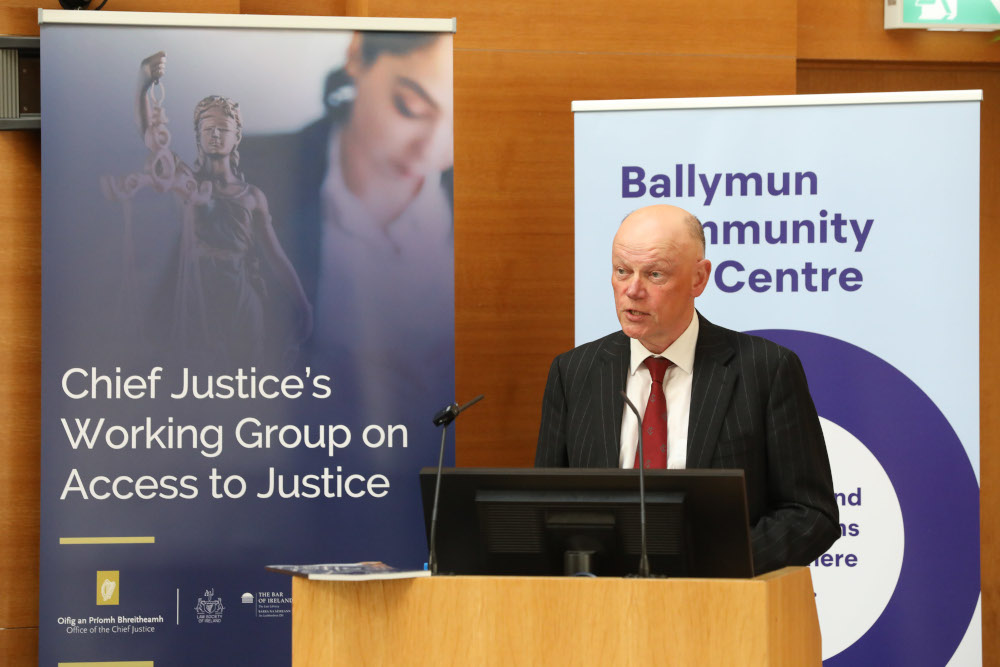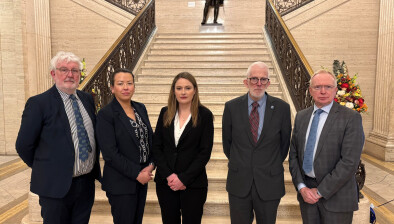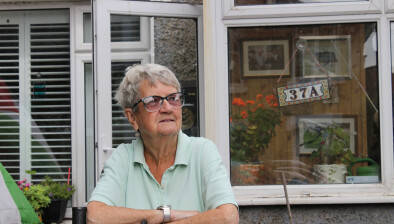Chief Justice: Don’t let Irish criminal justice system end up like the US

Pictured: Chief Justice Donal O'Donnell launching the access to justice report
Ireland is not immune from the same pressures that have led the United States to the point where some lawyers openly dispute whether the system delivers “justice” at all, the Chief Justice has warned.
Chief Justice Donal O’Donnell made the remarks yesterday as he launched a major report on access to justice, based on a two-day conference which took place last October to help guide a working group established by his predecessor, Frank Clarke.
The working group, which includes representatives from the Bar, the Law Society, the Legal Aid Board and legal rights group FLAC, will continue its work this year with a focus on the development of Ireland’s civil legal aid system.
Launching the access to justice report at the premises of Ballymun Community Law Centre, Chief Justice O’Donnell said it was “still difficult today to avoid the impression that there is something of a mismatch between what goes on in a courtroom and the world outside”.
He went on to use the US as an example of “what happens when a legal system becomes increasingly disconnected from daily reality”, explaining:
“In the United States, there are some highly developed and refined systems at state and federal level but for example, the point has been reached where some public defenders in the US at least, no longer refer to the criminal ‘justice’ system because that title implies that the system provides justice, something they increasingly are inclined to dispute. In addition, there is a growing tendency in academic circles, and other groups in civil society in the US – and this in a country that has spawned thousands of courtroom dramas – to even question the benefit of the adversarial system which is core to the common law concept of the administration of justice. It was a distinguished US lawyer Dean Wigmore who famously said that the adversarial system, and cross examination which is an essential part of that system was the greatest engine for discovery truth known to man, but we now see some of Wigmore’s successors question the value of the system. We should not assume that our system is immune from those pressures.”
Turning back to Ireland, he welcomed “the recognition that the problem of access to justice is complex and multifactorial and that there is no single easy answer”. He noted that it was once “fashionable to look to the State to provide answers and funding, almost without regard to cost, or the competing demands in society”.
He continued: “I think it is now better understood that progress in this area involves careful work by those who are attempting to simplify court procedures on the one hand, voluntary groups providing advice and assistance, private practitioners providing services sometimes pro bono, and perhaps consideration of the reform and regulation of third party funding models for private litigation.”
Justice minister Helen McEntee and the Department of Justice’s secretary general, Oonagh McPhillips, were among the guests at yesterday’s launch event, which also heard from Gary Lee, managing solicitor of Ballymun Community Law Centre.
Mr Lee pointed out that there was no legal provision in Ballymun, a town of 22,000 people, until the launch of Ballymun Community Law Centre in 2002. “There was, and continues to be, huge unmet legal need in this community,” he said.








